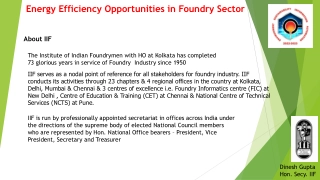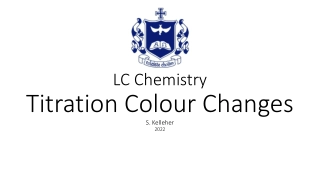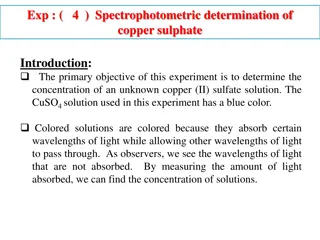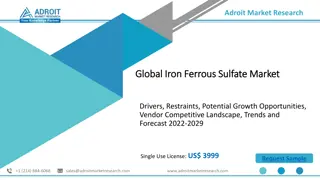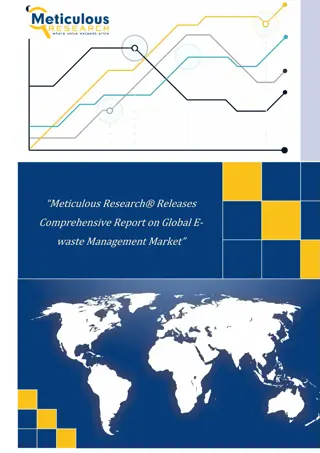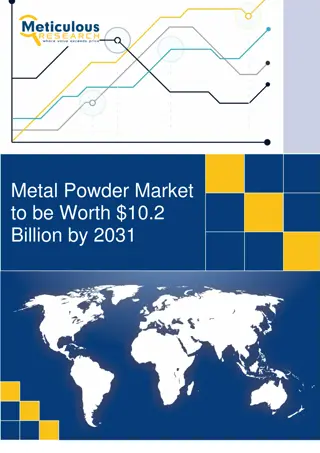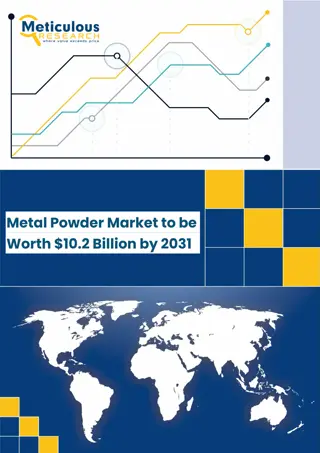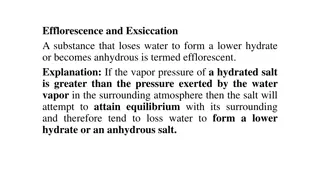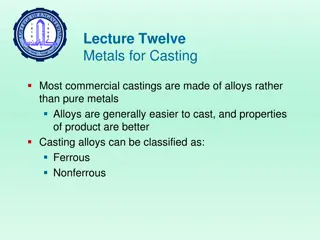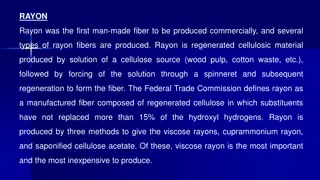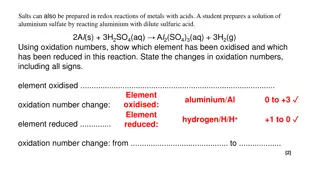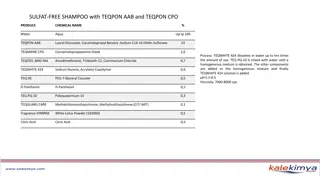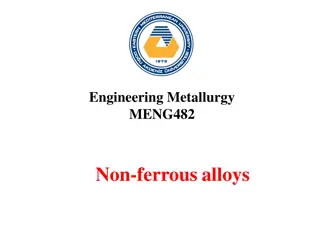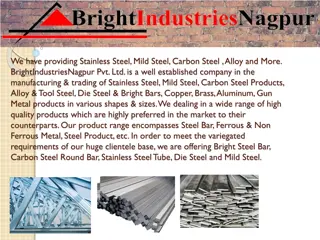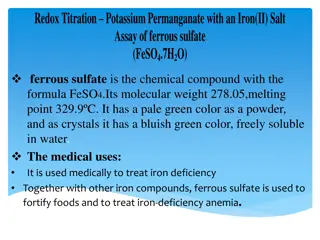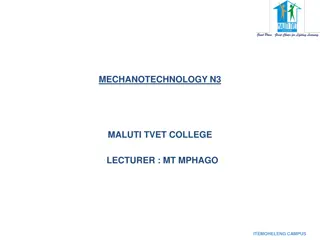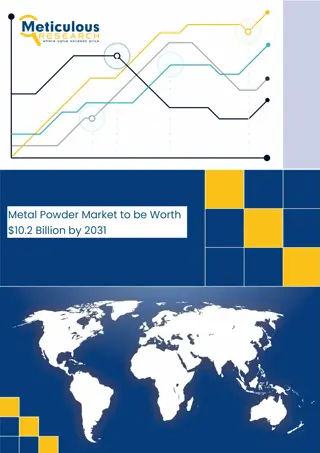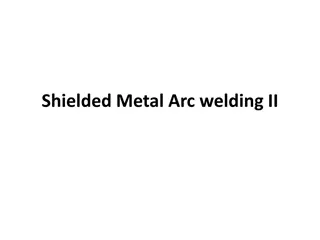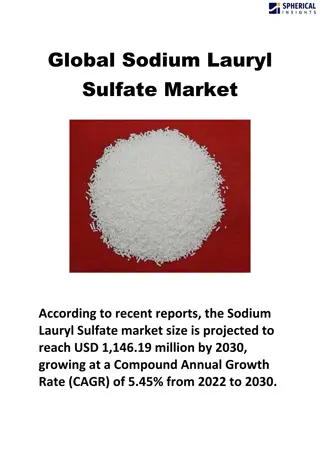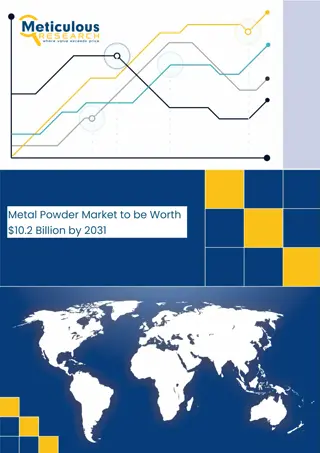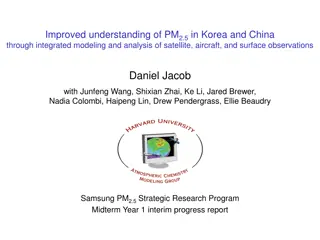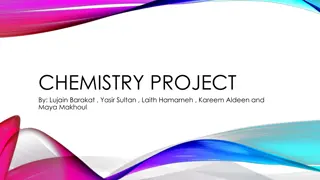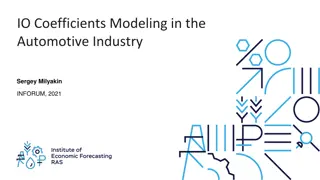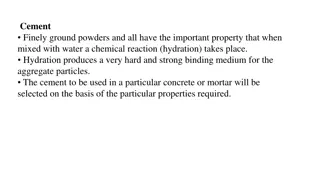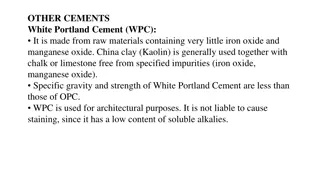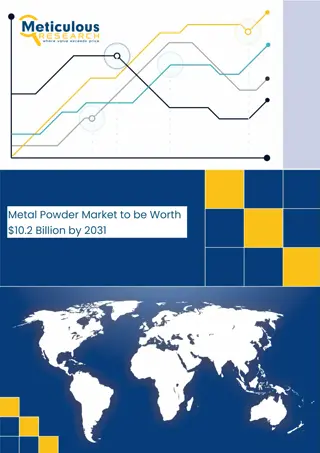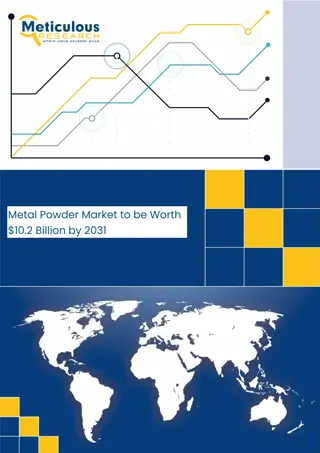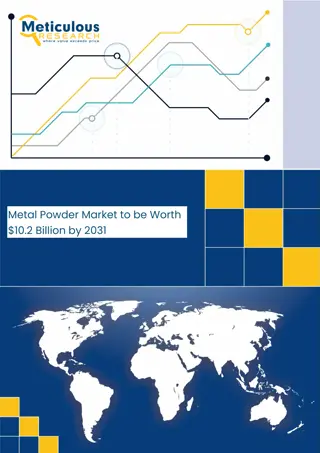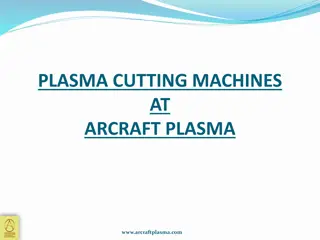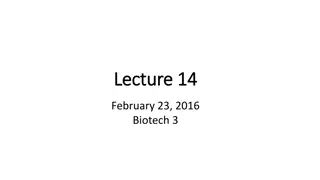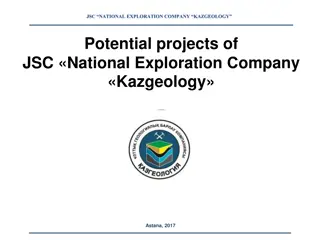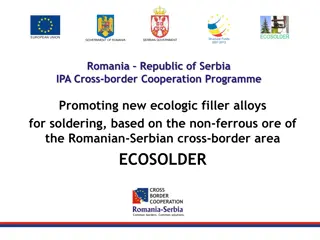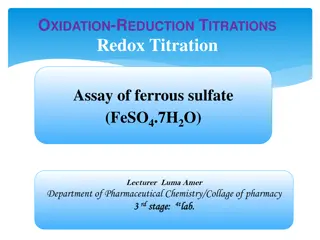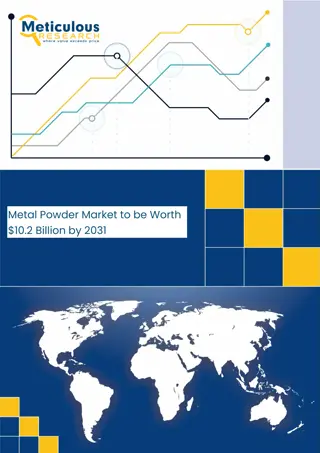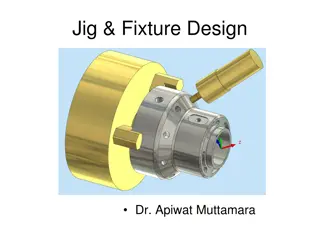Energy Efficiency Opportunities in Foundry Sector with IIF
The Institute of Indian Foundrymen (IIF) has been serving the foundry industry for 73 years, acting as a key reference point for stakeholders. They organize events like the Indian Foundry Congress and run various centers of excellence. The foundry industry in India consists of about 4000 units, with
0 views • 16 slides
Titration Colour Changes
This collection features various experiments in chemistry involving titration and solutions. It includes procedures such as standardizing hydrochloric acid using sodium carbonate, titrating hydrochloric acid with sodium hydroxide to produce sodium chloride, determining the concentration of ethanoic
0 views • 10 slides
Spectrophotometric Determination of Copper Sulfate Concentration
The experiment aims to determine the concentration of an unknown copper (II) sulfate solution by measuring light absorption at different wavelengths. Colored solutions absorb specific light wavelengths and appear colored to our eyes. By creating a calibration curve and following Beer's Law, the conc
3 views • 8 slides
Overview of Herbicides Classification and Groups
Herbicides are classified based on their chemical nature into inorganic and organic types. Inorganic herbicides, such as arsenic acid and copper sulfate, do not contain carbon atoms, while organic herbicides, like glyphosate and 2,4-D, contain carbon atoms. The classification includes various groups
4 views • 15 slides
Iron Ferrous Sulfate Market Size, Worth, Overview, Scope & Analysis to 2022-2029
Adroit Market Research has included the Global Iron Ferrous Sulfate Market\u00a0research to its database in order to provide a thorough analysis of the variables driving a general market growth trend. The study contains a lot of information and is a useful tool for professionals in the field.
0 views • 5 slides
Meticulous Research® Releases Comprehensive Report on Global E-waste Management Market
E-waste Management Market by Method (Recycling, Dispose\/Trash (Landfill, Incineration)), Source (Household, Industrial, IT & Telecom, Medical, Consumer), Material (Metal (Ferrous, Non-Ferrous), Plastic), Geography - Global Forecast to 2031\n
0 views • 4 slides
Metal Powder market
Metal Powder Market Size, Share, Forecast, & Trends Analysis by Metal Type (Ferrous, Non-Ferrous), Application (Additive Manufacturing, Pressing & Sintering, Others), Source, Production Method, End User (Automotive, Aerospace & Defense, Chemical, Oth
0 views • 3 slides
Metal Powder Market to be Worth $10.2 Billion by 2031
Metal Powder Market Size, Share, Forecast, & Trends Analysis by Metal Type (Ferrous, Non-Ferrous), Application (Additive Manufacturing, Pressing & Sintering, Others), Source, Production Method, End User (Automotive, Aerospace & Defense, Chemical, Oth
1 views • 5 slides
Efflorescence and Exsiccation in Chemistry
Efflorescence refers to the process where a substance loses water to form a lower hydrate or becomes anhydrous due to differences in vapor pressures. Hydrates with vapor pressures greater than the atmosphere tend to exhibit efflorescence. The rate of efflorescence increases with temperature. Exsicca
0 views • 103 slides
Overview of Casting Alloys: Ferrous and Nonferrous Options
Commercial castings are predominantly made from alloys rather than pure metals for better properties and casting ease. Ferrous casting alloys include cast iron and steel, each with unique characteristics and challenges. On the nonferrous side, aluminum, copper alloys, and zinc alloys offer various b
0 views • 15 slides
Overview of Rayon: Production, Properties, and Applications
Rayon, the first man-made fiber commercially produced, is a regenerated cellulosic material manufactured from wood pulp or cotton waste. Viscose rayon, the most common type, is produced through processes like the viscose method. Additives such as titanium dioxide, sodium sulfate, zinc sulfate, and g
2 views • 18 slides
Pediatric Dosage Calculations: Safe Medication Administration Guidelines
Learn how to calculate safe pediatric dosages for common medications such as Acetaminophen, Augmentin, Amoxicillin, and Ferrous Sulfate. Follow step-by-step instructions to determine the correct amount of medication to administer based on a child's weight and prescribed dosage. Ensure accuracy in do
1 views • 5 slides
Redox Reactions in Chemistry
Salts can be prepared through redox reactions involving metals and acids. This interactive lesson covers oxidation numbers, identifying oxidized and reduced elements, and explaining electron transfer in redox reactions. Examples include reactions of aluminum with sulfuric acid and magnesium with cop
2 views • 12 slides
Premium Sulfate-Free Personal Care Products with Teqpon
Discover a range of premium sulfate-free personal care products featuring Teqpon technology. From a gentle sulfate-free shampoo to a versatile nonionic fabric softener, each product is meticulously formulated with high-quality ingredients to cater to different personal care needs. The Teqpon technol
4 views • 8 slides
Overview of Non-Ferrous Alloys in Engineering Metallurgy
Non-ferrous alloys play a crucial role in engineering metallurgy due to their unique properties and advantages over ferrous alloys. This article explores the classification of materials, the limitations of ferrous alloys, and the properties and applications of non-ferrous metals like copper. Copper,
0 views • 25 slides
Leading Manufacturer and Supplier of Steel Products - Bright Industries Nagpur Pvt. Ltd.
Bright Industries Nagpur Pvt. Ltd. is a reputable company specializing in the manufacturing and trading of Stainless Steel, Mild Steel, Carbon Steel, Alloy, and more. With a wide range of high-quality products such as Bright Steel Bars, Tool Steel, and Die Steel, the company caters to diverse client
0 views • 5 slides
Redox Titration: Potassium Permanganate with Iron(II) Salt Assay
Ferrous sulfate (FeSO4.7H2O) is used in medical treatments for iron deficiency. This article discusses the redox titration process involving potassium permanganate and ferrous sulfate, along with the chemical principles, procedure, and calculations involved. Potassium permanganate is a powerful oxid
5 views • 7 slides
Metals: Properties and Heat Treatment Processes
Metals can be categorized into ferrous and non-ferrous based on the presence of iron. Ferrous metals contain iron, while non-ferrous metals do not. Each type has distinct properties like toughness, tensile strength, elasticity, plasticity, ductility, malleability, and hardness. Heat treatment proces
0 views • 9 slides
Metal powder
Metal Powder Size, Share, Forecast, & Trends Analysis by Metal Type (Ferrous, Non-Ferrous), Application (Additive Manufacturing, Pressing & Sintering, Others), Source, Production Method, End User (Automotive, Aerospace & Defense, Chemical, Others) &
1 views • 4 slides
Welding Current Selection and Electrode Factors in Shielded Metal Arc Welding
When selecting the welding current for Shielded Metal Arc Welding (SMAW), considerations such as plate thickness, cable length, arc initiation ease, arc blow, and welding position play crucial roles. Direct Current (DC) is preferred for thin sheets and odd position welding, while Alternating Current
0 views • 10 slides
Metal powder
Metal powder Size, Share, Forecast, & Trends Analysis by Metal Type (Ferrous, Non-Ferrous), Application (Additive Manufacturing, Pressing & Sintering, Others), Source, Production Method, End User (Automotive, Aerospace & Defense, Chemical, Others) &
1 views • 4 slides
PM2.5 in Korea and China Through Integrated Modeling and Analysis
Improved understanding of PM2.5 in Korea and China is achieved through integrated modeling of satellite, aircraft, and surface observations. Studies show fast oxidation of SO2 to sulfate PM during winter haze events, with correlations of sulfate with nitrogen oxides explained in-depth. The persisten
0 views • 13 slides
Copper Sulfate, Sodium Nitrate, and Ammonium Chloride in Chemistry Projects
Delve into the properties and uses of copper sulfate, sodium nitrate, and ammonium chloride in chemistry projects. Discover how these chemical compounds play vital roles in agriculture, industry, and everyday applications, from fungicides to food additives.
0 views • 9 slides
Top Non-Ferrous Metal Products in Demand for Indian Industries (1)
1.Aluminum: The Versatile Metal\n\nAluminum is one of the most popular non-ferrous metals in India, and for good reason. It is lightweight, strong, corrosion-resistant, and highly conductive. These properties make it suitable for a wide range of industries including automotive, construction, electri
3 views • 2 slides
Technological Shifts in the Automotive Industry: A Modeling Approach by Sergey Milyakin
This study explores the impact of technological shifts in the automotive industry through coefficients modeling, analyzing trends such as energy use, composite materials, digitalization, and autonomous driving. The assessment methodology differentiates between existing and upcoming technological cha
0 views • 34 slides
Different Types of Cement for Construction
Cement is a crucial component in concrete and mortar, with various types available based on specific project requirements. Types include Ordinary Portland Cement for general construction, Modified Portland Cement for sulfate resistance, High Early Strength Cement for quick setting, Low Heat Portland
0 views • 5 slides
Different Types of Cement
White Portland Cement (WPC) is ideal for architectural use due to its low iron and manganese oxide content, while High Alumina Cement (HAC) offers rapid hardening and sulfate resistance. Portland Pozzolan Cement provides greater sulfate attack resistance and is suitable for marine and hydraulic cons
0 views • 5 slides
North Atlantic Hurricane Drought and Aerosol Impact
This study explores the influence of sulfate aerosols on the late 20th-century North Atlantic Hurricane drought, focusing on the interaction of European sulfate aerosols and African dust. It investigates the radiative forcing effects and variability in hurricane activity, proposing hypotheses relate
0 views • 17 slides
Metal Powder
Metal Powder size, Share, Forecast, & Trends Analysis by Metal Type (Ferrous, Non-Ferrous), Application (Additive Manufacturing, Pressing & Sintering, Others), Source
0 views • 4 slides
Metal Powder
Metal Powder size, Share, Forecast, & Trends Analysis by Metal Type (Ferrous, Non-Ferrous), Application (Additive Manufacturing, Pressing & Sintering, Others), Source,
0 views • 4 slides
Metal Powder
Metal Powder size, Share, Forecast, & Trends Analysis by Metal Type (Ferrous, Non-Ferrous), Application (Additive Manufacturing, Pressing & Sintering, Others), Source,
0 views • 4 slides
Advanced Plasma Cutting Machines at Arcraft Plasma
Arcraft Plasma offers high-quality plasma cutting machines capable of cutting ferrous and non-ferrous materials up to 150mm thickness. These machines come in 12 models with beveling and hole piercing options. The plasma cutting process involves the use of air or inert gas to create plasma that melts
0 views • 12 slides
Protein Purification Techniques and Ammonium Sulfate Precipitation
Protein purification is a crucial process in biotechnology to isolate specific proteins from complex mixtures. Techniques such as exploiting physio-chemical properties, binding affinity tags, and biological activity are used. Ammonium sulfate precipitation, a common first step, involves adding incre
0 views • 60 slides
Potential Exploration Projects in Kazakhstan by JSC National Exploration Company Kazgeology
JSC National Exploration Company Kazgeology is involved in the exploration of platinum and gold ores in Eastern Kazakhstan, polymetallic ores in Karagandy region, and non-ferrous minerals in Kyzylkain area. The projects focus on detailed geological surveys, identifying mineralized zones, and estimat
0 views • 8 slides
Protecting Wild Rice in Minnesota: Sulfate Standards and Environmental Preservation
Understanding the importance of safeguarding wild rice in Minnesota due to its cultural, spiritual, and economic significance along with its sensitivity to sulfate pollution. Exploring sources of sulfate, the sulfate-sulfide relationship, and proposed solutions for maintaining wild rice populations.
8 views • 10 slides
EU-Serbia-Romania Cross-border Cooperation on Ecologic Filler Alloys for Soldering
This project, funded by the European Union Structural Funds 2007-2013, involves a collaboration between the Serbian and Romanian governments to develop new ecologic filler alloys for soldering. The initiative aims to promote the use of non-ferrous ores from the Romanian-Serbian cross-border area to
0 views • 10 slides
Assay of Ferrous Sulfate (FeSO4.7H2O) by Redox Titration Experiment
This experiment involves determining the weight and weight percentage of an unknown sample of FeSO4.7H2O through a redox titration using potassium permanganate solution. Ferrous sulfate, a chemical compound used in medical treatments, is oxidized to ferric sulfate in the presence of sulfuric acid. T
0 views • 9 slides
METAL POWDER (2)
METAL POWDER size, Share, Forecast, & Trends Analysis by Metal Type (Ferrous, Non-Ferrous), Application (Additive Manufacturing, Pressing & Sintering, Others), Source, Production Method, End User (Automotive, Aerospace & Defense, Chemical, Others) &
1 views • 4 slides
Metal Alloys and Carbon Composition in Metals
Metal alloys play a crucial role in various industries with different compositions like ferrous and nonferrous metals. Carbon content determines the properties of steels, from low to high carbon content. Each type has specific characteristics and applications in different sectors, offering diverse m
0 views • 24 slides
